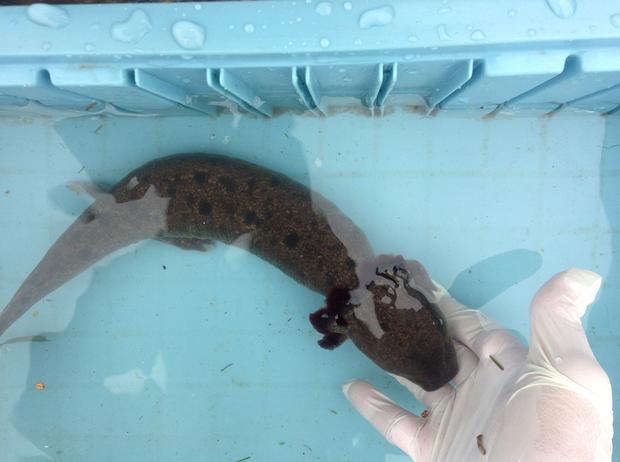Learn About 'Slime Dogs' And 'Snot Otters' Living In The Detroit River
It's your chance to meet a fascinating animal that lives around here but is often overlooked.
The terms "slime dog" and "snot otter" are nicknames for the mudpuppy – a large, permanently aquatic salamander native to the Detroit River, which will be celebrated at a free, family-friendly event on Saturday, April 1, 2017, 10 a.m. to 2 p.m.on Belle Isle.
The Belle Isle Nature Center's annual Mudpuppypalooza features fun and educational activities such as mask making, games, mudpuppy cookie decorating and a scavenger hunt. The event also includes the opportunity to hear from zookeepers who care for the mudpuppies at the Belle Isle Nature Center while learning about the species and conservation efforts on its behalf.
In 2006, the Detroit Zoological Society (DZS) began a long-term program to monitor the Detroit River mudpuppies, conducting catch-and-release surveys to track and better understand the size and health of local populations. The salamanders are briefly captured, then measured, weighed and implanted with small computer chips for identification before returning to the river. The water chemistry is also tested and logged.
"While not a threatened species, mudpuppies are considered good environmental indicators of pollution and other potentially harmful changes in the ecosystem," said DZS Chief Life Sciences Officer Scott Carter. "The data gathered in our mudpuppy surveys provides a valuable baseline for monitoring the health of the Detroit River ecosystem."
The mudpuppy (Necturus maculosus) is the second-largest salamander in the western hemisphere, ranging from 8 to 15 inches long. It is typically brownish-gray with dark spots, a yellowish belly and bushy purple gills behind its head, which it uses to breathe under water.
Operated by the DZS, the Belle Isle Nature Center sits on a 5-acre site surrounded by undisturbed forested wetlands on the east end of Belle Isle, near the Blue Heron Lagoon.
The facility — featuring indoor animal habitats, a bee exhibit, bird observation window, outdoor native butterfly garden, outdoor classrooms a nature play area and nature trail — is open daily 10 a.m. to 5 p.m. April through October and Wednesday through Sunday 10 a.m. to 4 p.m. November through March. Admission to the Nature Center is free; a State of Michigan Recreation Passport is required for all personal vehicles to enter Belle Isle State Park. For information, visit belleislenaturecenter.org.




